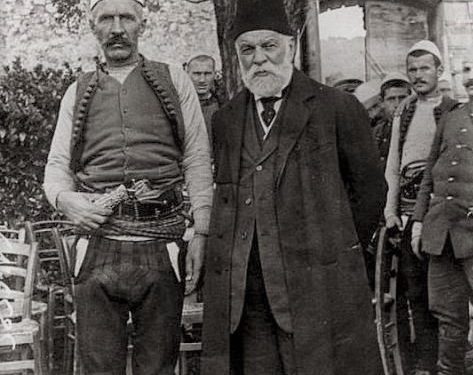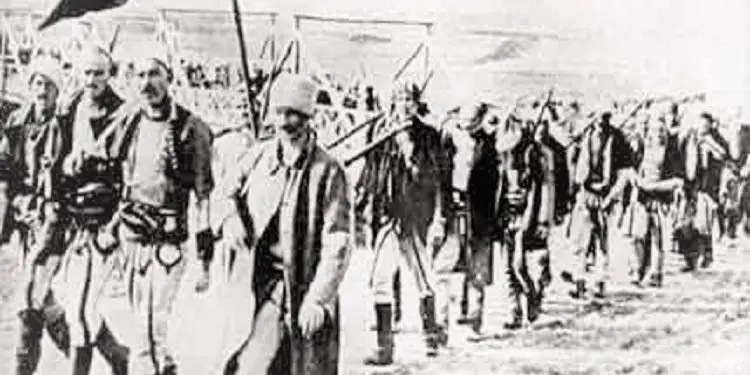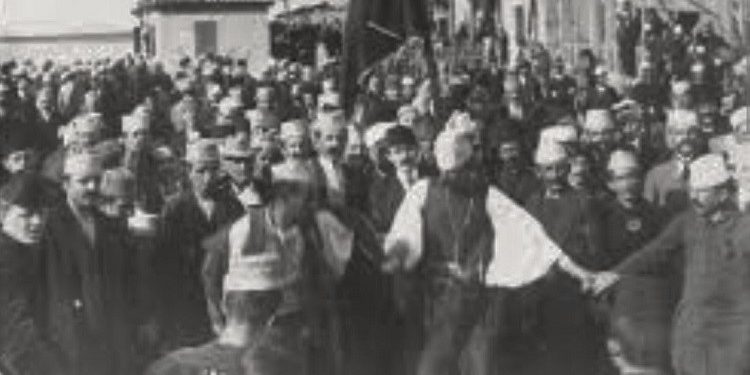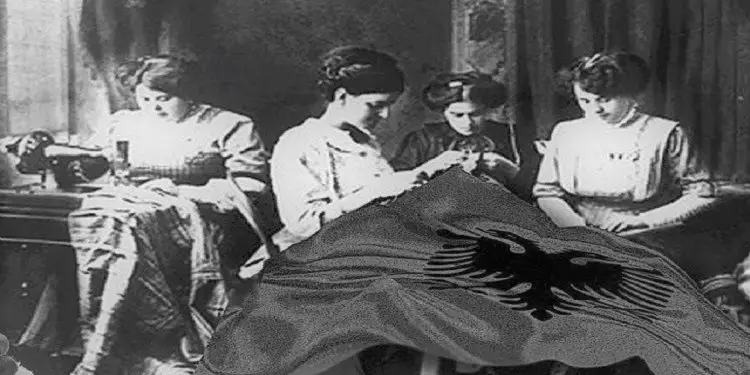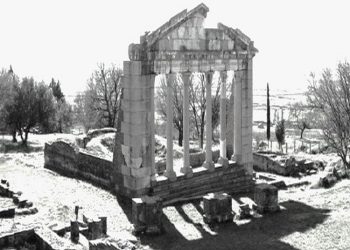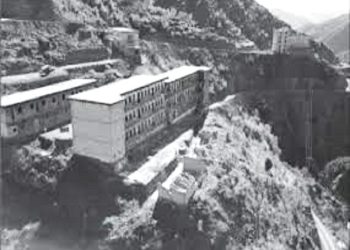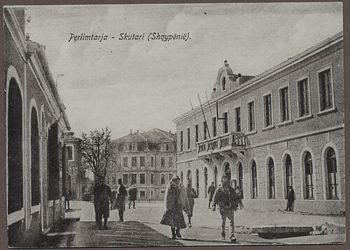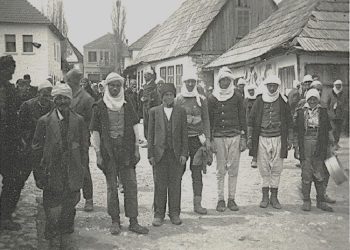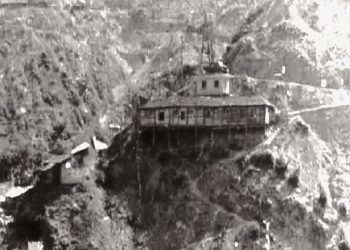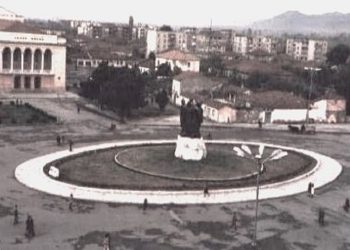By Prof. Vehbi Xhemaili
Part Two
Memorie.al / Ismail Qemali, with his own hand raised the Flag of Independence, embroidered with gold thread. So, Ismail Qemali raised the Flag embroidered with circles of leaves from Marigoja, on which flag was written the slogan: ‘Long live Albania’. This flag symbolizes the unity of the Albanian people wherever they live as a single nation among the Balkans. This Flag was later burned by the Greeks. With this national act, the full Independence of Ethnic Albania was declared. After this act, the Chairman of the Provisional Government of Vlora, on November 29, 1912, addressed the consuls of Vlora by telegram, the first telegram he sent to the consul of Austria-Hungary, then to Italy, France, Germany and Russia, through which he announced the declaration of the Independence of Albania and requested their official recognition.
Continued from the previous issue
HISTORY AND ORIGIN OF THE NATIONAL FLAG RAISED IN VLORA, ON NOVEMBER 28, 1912
Based on the documents, Rexhep Mitrovica was unanimously elected by the Vlora Assembly, a member of the Senate and Assistant Minister of World Affairs, even though he was only 24 years old.
It did not suit the communist regime that he figure as a protagonist of the Congress of Manastir, the Vlora Assembly, the National Assembly, during the Second World War, declared on October 16, 1943, where Rexhep Mitrovica was declared a High Member of the Regency, composed of Mehdi Frashëri, Fuat Dibra, Father Anton Harapi and Lef Nosi and, on November 5, 1943, the Regency appointed the government with Prime Minister Rexhep Mitrovica, who was also entrusted with the duty of Minister of Popular Culture.
Meanwhile, in the spring of 1944, Rexhep Mitrovica was also appointed Chairman of the Second League of Prizren, after Bedri Pejan. While, since he was ill, he soon withdrew and instead; he was joined by the polyglot and ideologist of the Second League of Prizren, Xhafer Deva. That is why this patriot with his national works, like Rexhep Mitrovica, was so much a hindrance to the communist policy and dictatorship of Enver Hoxha.
THE NATIONAL ASSEMBLY BEGAN ITS WORK ON 28 NOVEMBER 1912
On November 28, 1912, in the house of Xhemil Bey Vlora, the National Assembly began its work. “The Assembly began its work on November 28, Thursday, at 4 p.m.”. On the 15th of the third autumn. It was Thursday at 4 p.m., the bell had called out that at this time, Albania would be declared independent.
All the delegates had gathered in the house of Xhemil Bey Vlora, in a large living room of his house, where in the main speech, which Ismail Qemali gave, he described the defeat of Turkey and the fate of Albania, on the great danger that our homeland is in, he said there is no other salvation, except to raise the flag of Albania and declare self-government.
“Long lives our Albania”, everyone shouted. “Long live the Flag of Albania”. The large living room of the house was full of people, the veranda downstairs was full, the garden was full, and all the streets were full of people”.
Ismail Qemali closed his main speech before the assembly members with these words: “Now we have no other way of salvation left, except the separation of Albania from Turkey”, and proposed that: Albania declares Independence and forms a Provisional Government and appoints a Senate.
The proposals were unanimously approved by the Assembly. Ismail Qemali, who now held the position of Speaker of the Assembly, was also proposed as the mandate for organizing the Provisional Government and the Senate.
After their mandates had to be verified by the Assembly. After the approval of the foreseen points by the Assembly, Ismail Qemali proposed that: “Albania be declared a separate, free and independent state”.
As we said above, with the proposal of Rexhep Mitrovica, the Assembly unanimously accepted Ismail Qemali as the mandate holder for the proposal of the Provisional Government of Ethnic Albania, which included the four vilayets: Shkodra, Ioannina, Kosovo and Manastir.
SPEECH OF ISMAIL QEMALI AS THE FIRST PRIME MINISTER OF ETHNIC ALBANIA
Ismail Qemali, after receiving the mandate from the Assembly to proclaim the Provisional Government, spoke again briefly about the historical past of the Albanian people under Turkish rule, and about the heroic struggle of the Albanian people to gain their rights, to live free and sovereign in their land.
He also, in his exposition, pointed out the circumstances created in Albania by the development of the First Balkan War. He said that; “The only way to salvation is separation from the Ottoman Empire”.
The first measures he took were to declare Albania independent, with a Provisional Government, to elect an Eldership (Senate) to control the affairs of the government. The Senate consisted of 18 members, while the Mufti of Dibra, Vehbi Agolli, was elected as Chairman.
The third point was very important for those historical moments, which consisted of the formation of a Commission to defend the Albanian cause before the Great Powers. The President’s proposals were unanimously approved, with enthusiastic applause.
The delegates finally signed the historic document, the Declaration of Independence in Turkish, which stated: “Albania will today become independent, free and independent.” The Assembly finished its work at around half past five in the afternoon.
Then, all those present, including the assembly members and Ismail Qemali, headed to the balcony of the building to raise the national flag of Skanderbeg, where, in anticipation of this act, thousands of citizens had gathered outside the building to accompany the event with songs and dances, eagerly awaiting the great act of Independence.
Ismail Qemali received the flag from Naço, who held it in his hands, as Chairman of the Commission for raising the flag, but to this day, the antiquity and origin of this flag, which Ismail Qemali raised high, remains a mystery.
HOW MANY DELEGATES PARTICIPATED IN THE NATIONAL ASSEMBLY OF VLORA?
At five thirty in the afternoon, the Act of Declaration of Independence was signed by 37 delegates, who were present in the hall, Ismail Qemal, Nikollë Kaçorri, Abdul Aziz Vehbi Dibra, Dudë Karbunara, Elmas Boço, Vehbi Harxhi, Qazim Kokoshi, Jani Minga, Rexhep Mitrovica, Aristidh Rruçi, Abdi Toptani, Abas Dilaver Çelkupa, Mit’hat Frashëri, Shefqet Daiu, Zihni Abas Kanina, Xhelal Koprencka, Hajredin Cakrani, Qemal Elbasani (Karaosmani), Iljas Vrioni, Salih Gjuka, Dhimitër Berati, Dhimitër Emanuel Mborja, Dimitri Zografi, Murat Toptani, Pandeli Cale, Luigj Gurakuqi, Bedri Pejani, Spiro Ilo, Thanas Floqi, Lef Nosi, Dr. H. Myrteza, Nuri Sojliu, Mustafa Asim Kruja, M. Ferid Voskopola, Ymer Deliallisi, Xhemal Deliallisi, Nebi Sefa Lushnja, Zuhdi Ohri. While 2 names are illegible…”!
Another 26 delegates arrived during the following days. During the Assembly, an elected commission went and planted the Albanian flag in all public offices, where the Turkish one had flown the day before. The people who walked in front of the flag took off their white hats and each one kissed it first.
The paintings of the Sultan and Turkish officers were taken out of all public places, torn and trampled on. The inscriptions of the municipality, post office, telegraph and elsewhere, written in Arabic-Turkish letters, were thrown down and spat on.
Warm demonstrations took place at the consulates of Austria, Italy, and Russia, who responded “with love.” The next day, General Isa Boletini, Riza Bey Jakova, Mehmet Pasha Derralla, and several other Kosovo delegates were expected to arrive, accompanied by 400 brave men.
Although it was raining that day, a large majority had come forward with our flag in hand, when the three Kosovo flag bearers approached, dismounted from their horses and knelt before the national flag with tears in their eyes and kissed it with deep consolation, for the suffering and bravery that the Albanian people had shown, wherever they lived. (V. Xh).
WHO WERE THE DELEGATES FROM KOSOVO AND THE MONASTERY VILLAGE?
From Kosovo and the eastern territories, the Act of Independence was signed by these delegates, from Struga and Ohrid: Nuri Sojliu, Zuhdi Ohrid, Xhemal Beu and Dr. M. Murteza, who signed immediately after Lef Nosi. In all publications to date, he is noted as Dr. H. Myrteza.
But it should be noted that from Struga, big names of the Albanian National Movement participated, such as: Hamdi Bey Ohri, Murat Barutçiu and Dervish Hima. Also, mention should be made of Bejzat Saliu from Ohri, who according to claims was a telegraphist in Vlora (a job he also performed in Ohrid).
Also participating in the declaration of Independence in Vlora was the editor of the newspaper “Shkupi”, a tireless patriot of the national cause, Jashar Erebara from Dibra, who made a valuable contribution to the echo of the declaration of independence of Albania.
THE LIST OF INVITED ONES TO THE ACT OF INDEPENDENCE HAD 78 NAMES OF DELEGATES FROM ALL TERRITORIES OF ETHNIC ALBANIA, WHO SIGNED THE DOCUMENT OF INDEPENDENCE OF ALBANIA:
Vlora: Ismail Qemali, Zihni Abaz Kanina, Aristidh Ruçi, Qazim Kokoshi, Jani Minga, Eqerem Bey Vlora;
Berat: Sami Bey Vrioni, Ilias Bey Vrioni, Taq Tutulani, Baba Dud Karbunara;
Skrapar: Xhelal Bey Koprencka; Hajredin Bey Cakrani;
Lushnje: Qemal Bey Mullai, Ferit Bey Vokopola, Nebi Efendi Sefa;
Durrës: Abaz Efendi Çelkupa, Mustafa Agë Hanxhiu, Jahja Ballhysa, Dom Nikollë Kaçorri;
Tirana: Abdi Bey Toptani, Murat Bey Toptani;
Shijak: Xhelal bey Deliallisi, Ymer bey Deliallisi, Ibrahim Efendi;
Krujë: Mustafa Merlika-Kruja;
Elbasan: Lef Nosi, Shefqet bey Daiu, Qemal bey Karaosmani, Dervish bey Biçaku;
Peqin: Mahmud Efendi Kaziu;
Gramsh-Tomorricë: Ismail Qemali Gramshi (not Ismail bey Vlora);
Gjirokastër: Azis Efendi Gjirokastra, Elmaz Boçe, Veli Harxhi, Myfid Bey Libohova, Petro Poga, Jani Papadhopulli;
Përmet: Veli bey Këlcyra, Syrja bey Vlora;
Tepelena: Feim bey Mezhgorani;
Janinë: Kristo Meksi, Aristidh Ruçi;
Chameria: Veli Gërra, Jakup Veseli, Rexhep Demi, Azis Tahir Ajdonati;
Delvinë: Avni Bey Delvina;
Korça: Pandeli Cale, Thanas Floqi, Spiro Ilo,
Pogradec: Hajdar Blloshmi,
Shkodër: Luigj Gurakuqi,
Mat: Ahmet bej Zogu (later Zogu I), Riza bej Zogolli, Kurt Agë Kadiu,
Dibar: Mufti Vehbi Dibra, Sherif Langu, the mufti in Dibar and Ramiz Daci,
Kosovo; Gjakova and Plavë-Guci: Rexhep bej Mitrovica, Bedri bej Ipeku, Salih Gjuka, Mid′hat bej Frashëri, Mehmet pasha Derralla, Isa Boletini, Riza bej Gjakova, Hajdin bej Draga, Dervish bej Ipeku, Zenel bej Begolli and Qerim Begolli.
From the Eastern regions (present-day Macedonia); Ohrid and Struga: Zyhdi bej Ohrid, Dr. H. Myrtezai, Nuri Sojlliu, Hamdi bey Ohri, Mustafa Baruti and Dervish Hima from Ohri,
From the Albanian Colony of Bucharest the following delegates were elected: Mr. Pandeli Evangjeli, Dimitri Ilua, Dimitri Zografi, D. Emanoil and DH. Berati. Memorie.al




